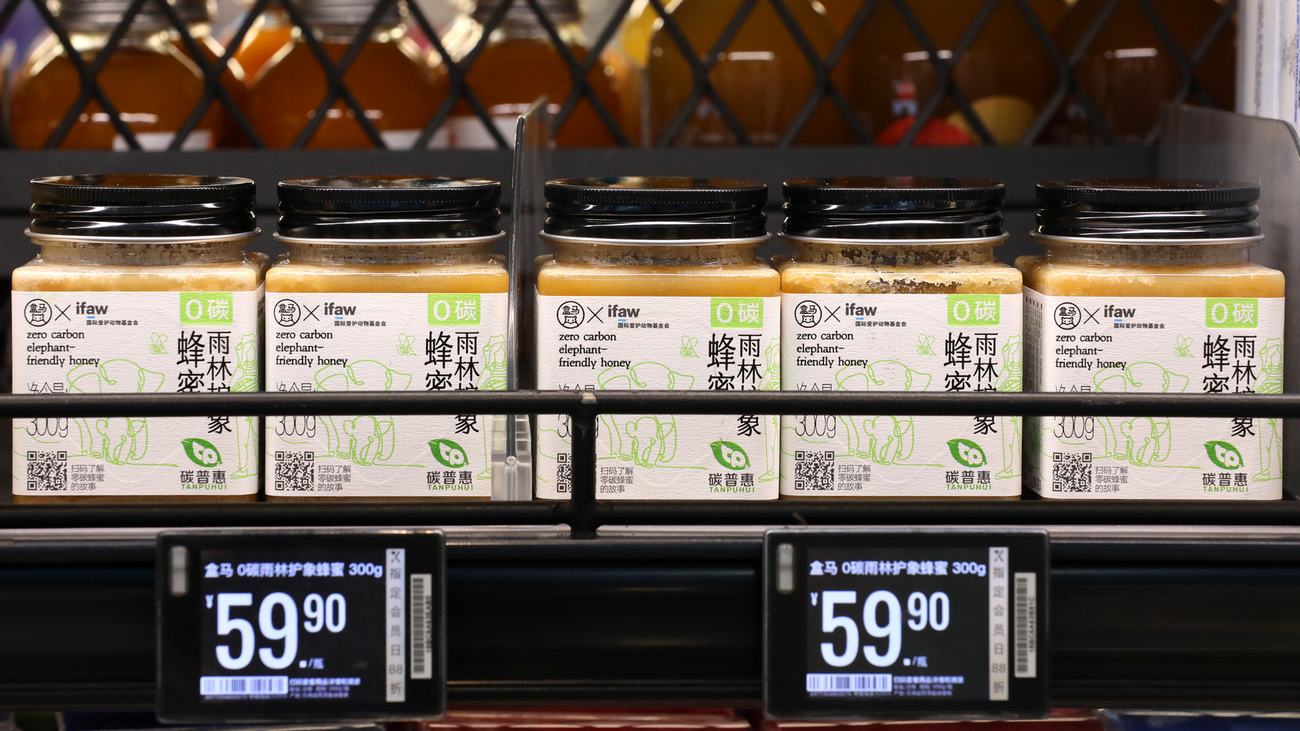Asian elephant protection – China
Conserving Asian elephant populations through coexistence initiativeshoney protects Asian elephants and reduces China's carbon
honey protects Asian elephants and reduces China's carbon

(April 21, 2023 - Beijing, China) A new honey product has hit the shelves in China offering consumers a way to protect Asian elephants while enjoying a sweet treat.
It is the first zero-carbon honey produced in China for the conservation of wild Asian elephants.
The honey, named Zero Carbon Elephant-Friendly Honey, is produced in a bee keeping project located in Daotangqing Village, southwest China as part of IFAW’s Asian Elephant Protection program.
"Zero Carbon Elephant-Friendly Honey is the outcome of our efforts to explore a community development model that combines biodiversity conservation, carbon reduction and rural revitalization together," said YK Ma, Program Manager with IFAW China office.
“We believe this pilot project can serve as a model for more communities in China as they seek opportunities for sustainable development and to contribute to China’s national carbon reduction targets.”
Home to just 34 households, Daotangqing sits adjacent to the Xishuangbanna Prefecture of Yunnan Province—one of the last remaining wild Asian elephant habitats in China.
Once widely found across tropical and subtropical ecosystems, wild Asian elephants have increasingly suffered the impact of habitat loss and fragmentation. This overlap with human populations often leads to incidences of human-wildlife conflict that threaten the resources and safety of animal and people alike.
In an aim to foster greater coexistence, the Daotangqing bee keeping project was established in June 2020, together with Yunnan Xishuangbanna National Reserve Administration and Xishuangbanna Tropic Rainforest Conservation Foundation (XTRCF). Its goal is to strengthen the community’s resilience to the economic loss caused by elephants and contribute to long-term habitat conservation. Bee keeping provides local communities an eco-friendly alternative livelihood and relieves human elephant conflict by reducing encounters with wild elephants in the forest.
The honey is able to be produced with zero carbon through IFAW's partnership with Swire Coca-cola. Together, the organizations are helping Daotangging residents move away from growing rubber plantations in favor of more eco-friendly crops with higher carbon sequestration value. The partnership also involves helping residents utilize solar power and other sources of renewable energy.
After two years of preparation, IFAW and Freshippo, a new retail brand from Alibaba, launched a co-branded zero carbon honey in March this year.
"Humans are interdependent with animals and their natural environment. We hope to help local communities in Yunnan have better development through this Zero Carbon Elephant-Friendly Honey, and to awaken more consumers to energy conservation and environmental awareness," said Yiming Dong of Freshippo.
The first batch of about 3,000 bottles of Zero Carbon Elephant-friendly Honey is available for purchase at Freshippo's online and offline stores. Proceeds from the products will be used to support the sustainable development of the community.
Ends
Notes to Editors:
How to achieve zero-carbon
Beekeeping is a low-carbon way of livelihood, and carbon dioxide emissions mainly comes from production, transportation, processing and packaging. Yet, all these emissions have been offset by activities such as the use of solar water heaters, replacing rubber planting with eco-friendly crops and plants, and installing photovoltaic power generation equipment in Daotangqing.
Press Contact:
Sabrina Zhang
Communications Manager
Tel: 86 10 64402960
Email: qzhang@ifaw.org
Related content
Our work can’t get done without you. Please give what you can to help animals thrive.